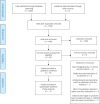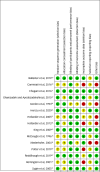Randomised controlled trials of antidepressant and anti-anxiety medications for people with autism spectrum disorder: systematic review and meta-analysis
- PMID: 34593083
- PMCID: PMC8503912
- DOI: 10.1192/bjo.2021.1003
Randomised controlled trials of antidepressant and anti-anxiety medications for people with autism spectrum disorder: systematic review and meta-analysis
Abstract
Background: Although widely used, the current evidence for the efficacy of antidepressant and anti-anxiety medications for people with autism spectrum disorder (ASD) is limited and conflicting.
Aims: We carried out a systematic review and meta-analysis of randomised controlled trials that assessed the effectiveness of these medications in people with ASD.
Method: We searched the following databases: Cochrane Library, Medline, EMBASE, CINAHL, PsycINFO, ERIC, DARE and ClinicalTrials.gov. Additionally, we hand-searched 11 relevant journals. We used the Cochrane risk-of-bias tool and Jadad score to assess the quality of each included study. We carried out a meta-analysis using a random effects model.
Results: We included 15 randomised controlled trials (13 on antidepressants and two on anti-anxiety medications) for a total of 958 people with ASD. Data showed contradictory findings among the studies, with larger studies mostly showing a non-significant difference in outcomes between the treatment and the placebo groups. Meta-analysis of pooled Yale-Brown Obsessive Compulsive Scale and Clinical Global Impression Scale data from nine studies (60%) did not show any statistically significant inter-group difference on either of the outcome measures. The adverse effects reported were mild and, in most studies, their rates did not show any significant inter-group difference.
Conclusions: Given the methodological flaws in the most included studies and contradictory findings, it is difficult to draw any definitive conclusion about the effectiveness of either antidepressant or anti-anxiety medications to treat either ASD core symptoms or associated behaviours. Robust, large-scale, randomised controlled trials are needed to address this issue.
Keywords: Autism spectrum disorder; anti-anxiety medications; antidepressants; meta-analysis; systematic review.
Conflict of interest statement
None.
Figures




References
-
- American Psychiatric Association. Diagnostic and Statistical Manual of Mental Disorders (5th edn). American Psychiatric Publishing, 2013.
-
- World Health Organization. International Classification of Diseases for Mortality and Morbidity Statistics (11th Revision). World Health Organization, 2019. (https://icd.who.int/browse11/l-m/en).
-
- Bachmann CJ, Manthey T, Kamp-Becker I, Glaeske G, Hoffmann F. Psychopharmacological treatment in children and adolescents with autism spectrum disorders in Germany. Res Develop Disabil 2013; 34(9): 2551–63. - PubMed
-
- Simonoff E, Pickles A, Charman T, Chandler S, Loucas T, Baird G. Psychiatric disorders in children with autism spectrum disorders: prevalence, comorbidity, and associated factors in a population-derived sample. J Am Acad Child Adolesc Psychiatry 2008; 47(8): 921–9. - PubMed
-
- Jobski K, Höfer J, Hoffmann F, Bachmann C. Use of psychotropic drugs in patients with autism spectrum disorders: a systematic review. Acta Psychiatr Scand 2017; 135: 8–28. - PubMed
Publication types
LinkOut - more resources
Full Text Sources

